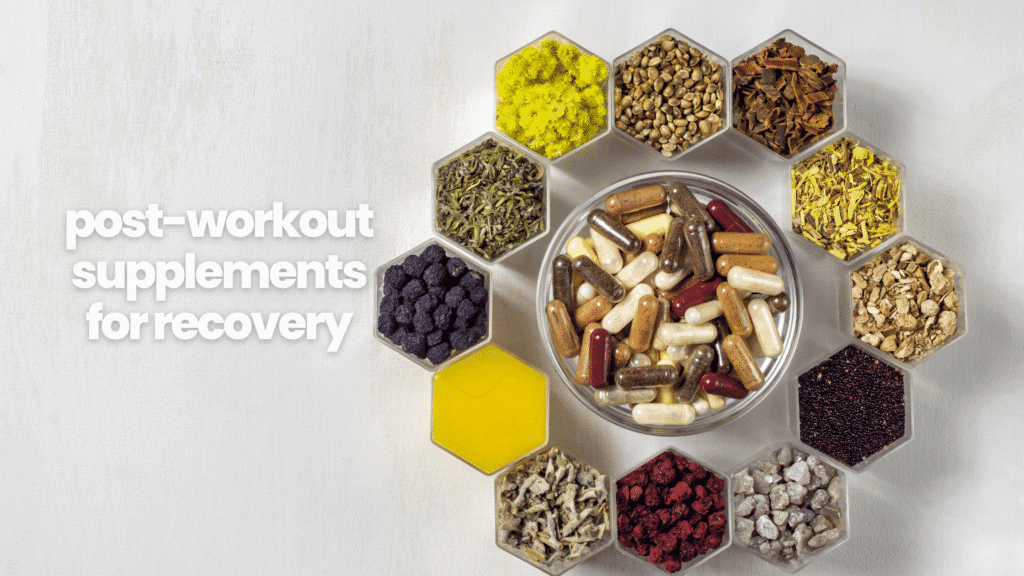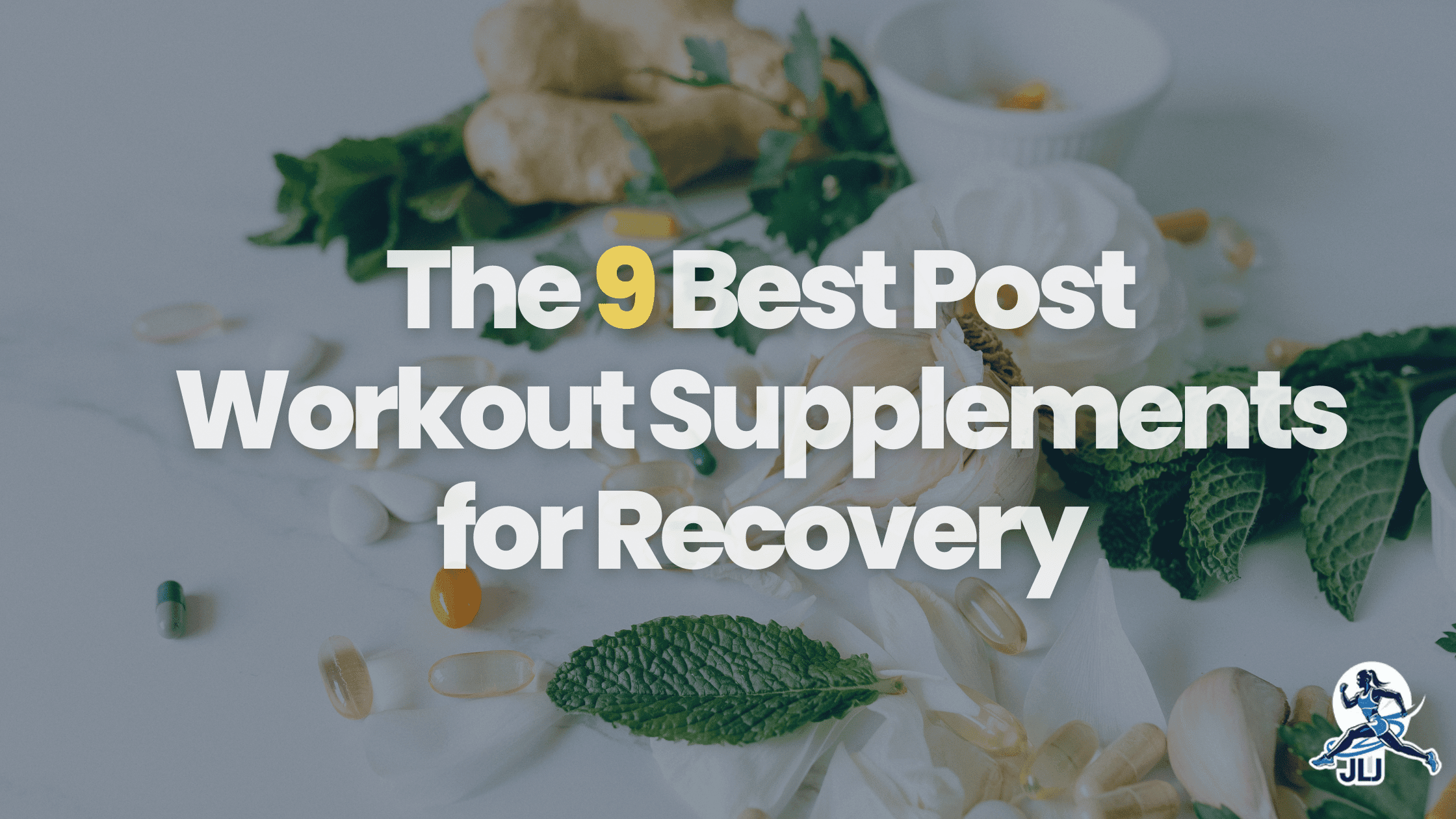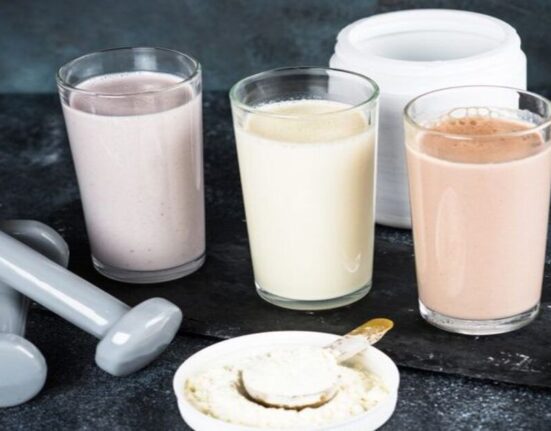Post-workout supplements for recovery are more than just fitness buzzwords—they’re essential tools for helping your body bounce back after exercise. That post-gym soreness is a sign of a good workout, but it’s also your body’s way of saying, “I need support.” Muscle recovery is the process of repairing the tiny tears in your muscle fibers and restoring the energy you used during training. It’s what helps you build strength, reduce fatigue, and stay consistent with your workouts.
While rest, nutrition, and hydration are fundamental to recovery, the right supplements can play a powerful supporting role. In this article, we’ll explore the most effective post-workout supplements for recovery—backed by scientific research—to help you reduce soreness, speed up healing, and get back to training stronger than before.
Why Post-Workout Recovery is Crucial for Your Fitness Goals?
Think of your workout as placing an order for stronger muscles. The actual delivery—the part where you see real results—happens during recovery. It’s easy to believe that the hard work is done the moment you drop the weights, but in reality, your body is just getting started.
Here’s what’s happening behind the scenes and why it matters so much:
1. You’re Rebuilding, Not Just Resting
During a challenging workout, you create tiny, microscopic tears in your muscle fibers. This isn’t a bad thing; it’s the signal that tells your body it’s time to adapt. Proper recovery kicks off the crucial process of muscle repair. This is the magic behind muscle growth, a process known as muscle protein synthesis. Your body rushes nutrients (like protein) to the site, patching up the fibers and, most importantly, making them thicker and more resilient than before. Without this rebuilding phase, you’re simply breaking your muscles down without letting them grow back stronger.
2. You’re Refueling an Empty Tank
Imagine your muscles have a fuel tank filled with a high-octane energy source called glycogen. Every set, rep, and sprint uses up this fuel. Effective recovery is all about glycogen replenishment—refilling that tank so you’re ready for what’s next. If you skip this step, you’ll walk into your next workout feeling sluggish and weak. Your performance will plummet because your muscles simply won’t have the immediate energy they need to fire on all cylinders.
3. You’re Managing the After-Effects
That controlled damage from exercise triggers a natural inflammation response. A little bit is good; it’s a signal for repair. But too much can lead to excessive pain and stiffness. It’s what leads to that tell-tale muscle soreness, often peaking a day or two later in what we all know and love (to hate) as Delayed Onset Muscle Soreness (DOMS). A smart recovery strategy helps manage this inflammation, so you feel less pain and are able to move freely, stick to your routine, and stay consistent on your fitness journey.
Check also: Top Rated Whey Protein Powder You Can Trust in 2025
What are the best post-workout supplements for recovery?

Before we dive in, remember this: supplements are exactly that—supplementary. They are helpers, not magic bullets. They work best when your nutrition, sleep, and hydration are already on point. With that in mind, let’s explore the science-backed players that can give your recovery a real edge.
1. Protein Powders (Whey, Casein, & Plant-Based)
If muscle recovery were a construction site, protein would be the truckloads of bricks and mortar. After a workout, your body is desperate for these building blocks to start the muscle repair process. A protein shake is simply the fastest, most convenient way to deliver them.
- Whey: This is the fast-acting superstar, absorbed quickly to kickstart muscle protein synthesis almost immediately after your workout. It’s the go-to for that post-gym recovery shake.
- Casein: Think of this as the slow-release specialist. It digests over several hours, making it perfect for before bed to feed your muscles and prevent breakdown overnight.
- Plant-Based (Pea, Soy, Rice): These are no longer the underdogs. Modern plant-based protein powders offer complete amino acid profiles and are fantastic, highly effective options for everyone, regardless of dietary choices.
2. Creatine
Creatine is one of the most studied and effective supplements on the planet, and it does more than just boost strength. For recovery, its primary job is to rapidly regenerate your muscles’ main energy source (ATP). Think of it as plugging your muscle cells directly into a charger. This helps you recover faster between sets and replenishes your energy stores more efficiently after the workout is over, preparing you for the next one.
3. Branched-Chain Amino Acids (BCAAs)
BCAAs are three specific amino acids: leucine, isoleucine, and valine. Leucine, in particular, acts like a powerful signal that tells your body to start the muscle growth and repair process. They can be helpful for reducing muscle soreness (DOMS). Here’s the deal: if you’re already getting plenty of protein from food and shakes, you’re likely getting enough BCAAs. But if you train in a fasted state or struggle with protein intake, they can be a useful shortcut.
Check also: Supplements for Stress Relief: Say Goodbye to High Cortisol
4. HMB (β‑Hydroxy‑β‑Methylbutyrate)
A lesser-known but powerful ally, HMB is a substance your body produces when it breaks down leucine (that key BCAA). Its main talent isn’t so much building new muscle, but rather protecting the muscle you have by reducing post-exercise breakdown. It acts like a security guard, preventing your body from taking apart muscle tissue for fuel, which is especially helpful during intense training phases or when returning from a break.
5. Magnesium
Magnesium is the quiet workhorse of muscle recovery. This essential mineral is involved in over 300 bodily processes, including muscle function, nerve signaling, and energy production. Critically, it helps your muscles relax after contracting and plays a key role in promoting restful sleep—which is when the most potent recovery happens.
6. Vitamin D
More than just a bone-booster, Vitamin D is now understood to be vital for muscle health. Research shows that adequate levels can help improve muscle function, reduce inflammation, and support the overall muscle repair process. Since many people are deficient, ensuring you have enough can be a simple but effective recovery win.
7. Omega-3 Fatty Acids
Think of the intense soreness you feel after a tough workout. A lot of that comes from inflammation. Omega-3s, typically found in fish oil, are natural anti-inflammatory powerhouses. They can help tame that excessive inflammatory response, leading to a noticeable reduction in DOMS and allowing you to move more freely the next day.
8. Turmeric/Curcumin & Antioxidants
Like Omega-3s, certain plant-based compounds are brilliant at managing soreness. Curcumin (the active compound in turmeric) and the antioxidants in foods like tart cherries are fantastic at fighting exercise-induced inflammation and oxidative stress. They won’t build muscle directly, but they can significantly dial down the pain from DOMS, making your recovery feel much more comfortable.
9. Electrolytes & Fluids
This isn’t just about drinking water. During sweat-soaked workouts, you lose crucial electrolytes like sodium and potassium. These minerals are the tiny electrical messengers that govern muscle contractions and fluid balance. Proper hydration with electrolytes is fundamental for performance and recovery; without it, your muscles can’t function or repair themselves properly.
Check also: Supplements to Lower Cortisol: Your Secret Weapon Against Stress
The Real Pillars of Recovery: It’s Not Just About Supplements
Before diving into powders and pills, it’s important to understand this: no supplement can make up for the basics. Recovery starts with what you eat, how you hydrate, and how well you rest. These are the real pillars that allow your body to heal, grow, and come back stronger after each workout.
Fueling with Food: The Role of Protein and Carbs
Muscle repair begins in the kitchen. After a workout, your muscles are in a fragile state—tiny fibers have broken down, and energy stores have been drained. This is where protein and carbohydrates come in.
Protein delivers the amino acids your body needs to trigger muscle protein synthesis—the process that rebuilds and strengthens muscle tissue. Whether it’s from a grilled chicken breast, Greek yogurt, or a post-workout shake, getting high-quality protein into your system makes a real difference.
Carbs, on the other hand, help replenish glycogen—the fuel your muscles used during exercise. Skipping carbs after a tough workout is like trying to drive home on an empty tank. Aim for a mix of both protein and carbs within an hour or two post-exercise. It doesn’t need to be fancy—sometimes a simple tuna sandwich or a smoothie does the trick.
The Importance of Hydration and Electrolytes
Sweat isn’t just water—it’s packed with electrolytes like sodium, potassium, and magnesium. These minerals play a big role in keeping your muscles functioning properly and reducing the risk of cramps or fatigue.
After a workout, especially in hot weather or after intense sessions, hydration becomes essential. Plain water is good, but if you’ve lost a lot of fluids, consider adding a pinch of salt, an electrolyte mix, or even sipping on coconut water to restore balance. Your body can’t recover well if it’s running dry.
Don’t Underestimate Sleep and Active Recovery
If food and hydration are the foundation, sleep is the roof. It’s during deep sleep that your body gets to work on reducing inflammation, repairing muscle tissue, and releasing growth hormones. Cutting corners on rest, even with the best supplements, slows everything down.
And then there’s active recovery—light movement on rest days, like stretching, walking, or yoga. It keeps blood flowing to sore muscles without stressing them out, helping your body stay mobile and prevent stiffness.
Check also: Best Rated Protein Powder for Women in 2025
How to Choose a Quality Recovery Supplement?
Choosing the right supplement is simple if you know what to look for. Here are the three essential rules to follow:
- Prioritize Third-Party Testing. The supplement industry isn’t strictly regulated. A seal from an organization like NSF Certified for Sport or Informed-Sport is your guarantee that the product is pure and actually contains what the label says.
- Read the Back Label, Not the Front. The front is for marketing; the back is for facts. Look for a clear ‘Supplement Facts’ panel with specific ingredient dosages. Be wary of vague terms like ‘proprietary blends.’
- Consult a Professional. More isn’t always better. A doctor or registered dietitian can help you determine the right dosage for your specific needs, ensuring your choice is both safe and truly effective for your goals.
Check also: The 5 Best Pre Workout Supplements for Beginners (2025 Edition)
Frequently Asked Questions
How do I know if a supplement is actually safe?
It’s a surprising fact, but supplements aren’t regulated by the FDA in the same way medications are. Your best bet is to look for a third-party certification seal on the bottle. This seal means an independent group has tested the product to verify that what’s on the label is actually inside the container—and that it’s free from harmful contaminants. Keep an eye out for seals from NSF Certified for Sport, Informed-Sport, or USP.
What should I look for on the label?
A reputable product will always be transparent. The label should clearly show a “Supplement Facts” panel with all active ingredients and serving sizes, a full list of inactive ingredients, and the manufacturer’s name and location. If that basic information is missing, it’s a red flag.
How much of a supplement should I take?
This is where “more is better” is definitely not the rule. The right dosage depends entirely on your personal needs, diet, and training. Taking too much can be ineffective at best and harmful at worst. The smartest move is to talk with a doctor or registered dietitian. They can help you figure out what you truly need—sometimes a simple blood test can reveal a specific deficiency—so you can supplement smartly and safely.
What is the best supplement for muscle recovery?
The best overall supplement is whey protein, as it provides essential amino acids that help repair and rebuild muscles. Creatine and BCAAs are also great for reducing soreness and speeding up recovery.
What to take after a workout for muscle recovery?
A combination of protein (like a whey shake) and carbohydrates helps restore energy and kick-start muscle repair. You can also add electrolytes to rehydrate and creatine to support strength recovery.
Are natural post-workout supplements effective?
Yes. Natural options like turmeric (curcumin), omega-3 fatty acids, and magnesium can help reduce inflammation, support recovery, and improve muscle function—especially when combined with a healthy diet.
Do post-workout supplements really help with recovery?
Yes, they can. While food and sleep are the foundation of recovery, certain supplements (like protein, creatine, and BCAAs) can enhance muscle repair, reduce soreness, and speed up recovery time.
How soon after a workout should you take supplements?
Ideally within 30 to 60 minutes post-workout. This is when your muscles are most ready to absorb nutrients and start the recovery process.
At the end of the day, recovery is where real progress happens—and the right support can make a big difference. While nothing replaces a balanced diet, good sleep, and proper hydration, post workout supplements for recovery can help fill in the gaps and give your body the tools it needs to rebuild and grow stronger. From protein powders and creatine to natural anti-inflammatories and electrolytes, the options are plenty—but choosing what works best for your body is key. Start with the basics, listen to how your body responds, and build a recovery routine that supports your long-term goals.
Did you find this helpful or have something to add? Let us know in the comments section!
Sources:
Nutrition & Supplements for Post-Workout Muscle Recovery
7 Top Supplements for Muscle Recovery, Plus How To Choose
The 7 Best Supplements for Muscle Recovery












